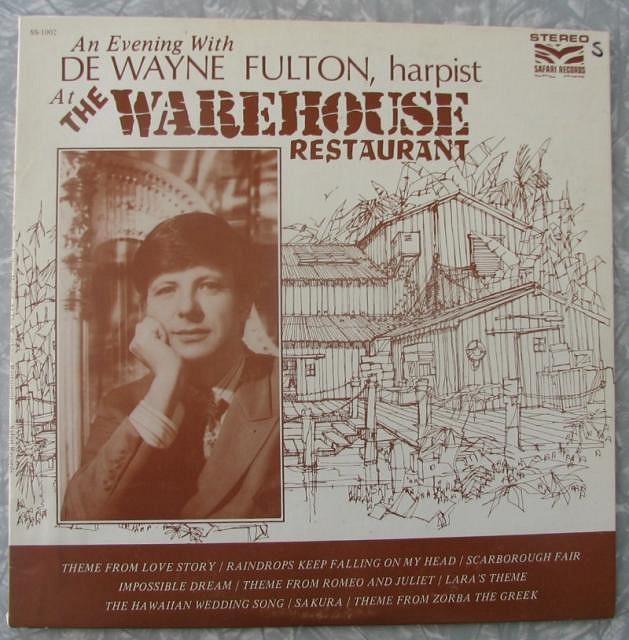Tiki Central / Tiki Music / Restaurant Records!
Post #334533 by Sabu The Coconut Boy on Mon, Sep 24, 2007 1:40 AM
|
STCB

Sabu The Coconut Boy
Posted
posted
on
Mon, Sep 24, 2007 1:40 AM
Here's another one to add to the list. And it's just down the street from Bigbro's "Pieces of Eight":
I've found several De Wayne Fulton lps in my garage-sale hunts, because he played at several restaurants in the South Bay area of Los Angeles. But this is the first one from a bona-fide South Seas restaurant. Luckilly, the Warehouse still exists in all its tropical splendor, while the Pieces of Eight is now "Shanghai Reds" and has lost it's beachcomber atomosphere. Here's the text from the back of the album: "They come from Hawaii and San Francisco, from Chicago, New York and as far away as Syndey, Australia to dine at The Warehouse, the unique Los Angeles restaurant overlooking the waters of the Marina Del Rey. But they come for more than just the continental cuisine... they have heard of the exciting atmosphere which has caused The Warehouse to be called the "Disneyland of the Marina". And they have heard of the unusual sounds of De Wayne Fulton, international pop harpist, who nightly provides entertainment to capacity audiences. Burt Hixson, The Warehouse's young owner, first heard De Wayne 11 years ago at the Surfrider Hotel in Waikiki, Hawaii, when The Warehouse was in its first stages of planning. Mr. Hixson decided then that De Wayne would play in his restaurant, and when it opened 10 years later, De Wayne was an immediate success. He has since played the longest steady engagement in the Marina... 18 months... and developed a remarkable rapport with the audiences that fill The Warehouse lounge to hear a repertoire that he constantly updates with "now sounds" but that features standards and classical pieces as well. Such versatility and skill is the result of serious study that began in 1948, when De Wayne began studying under the direction of Kajetan Attl, harpist with the San Francisco Symphony. He went on to the Julliard School of Music, where he studied under NBC Symphony Harpist Edward Vito for a year. In 1950, De Wayne entered the Academy of Music in Vienna, Austria and was graduated four years later. He then spent two summers at the Mozarteum in Salzburg. Following that period, he accepted the position of Professor of Harp at the Conservatory of Music in Istanbul, Turkey, and continued in that capacity for three years. During this time, De Wayne appeared with the Instanbul Symphony as first harpist. He then joined the Berlin Philharmonic Orchestra in the same postition and remained a year. In 1959, De Wayne joined the Honolulu Symphony and a year later made his night club debut at the Surfrider Hotel in Waikiki, where he continued his engagement for an unprecedented eight years. Word of De Wayne's talent spread to far reaches of the world and in 1964 he played an engagement at the Palace Hotel in Tokyo. During one of the two subsequent engagements at the Palace Hotel, in 1966, he was asked to play a command performance for Ambassador Reischauer at the American Embassy in Tokyo. In the same year, De Wayne was the only entertainer to perform for President Johnson during the Summit Conference in Honolulu. He made his Carnegie Hall debut on June 11, 1968 when he joined singer Charles K.L. Davis. De Wayne now makes his home in Los Angeles and continues to expand his reputation as the first harpist to perform publicly with an electrically amplified harp. LOS ANGELES magazine said of The Warehouse: "For many, the biggest attraction is the entertainment... De Wayne Fulton, a pop harpist whose melodies fill the rafters with romance." Another magazine, PICTORIAL CALIFORNIA AND THE PACIFIC, echoed that praise, calling De Wayne "a superb harpist who was schooled in the classics and spellbinds his audiences with all types of selections." In this, his seventh album, De Wayne offers a collection of his most requested numbers with a variety of effects, including tremolo, reverb and echoplex. The songs range in variety from such contemporary numbers as "Theme from Love Story" and "Scarborough Fair" to the ethnic music of Japan in "Sakura', in which De Wyne emulates the sound of the koto, the traditional Japanese 13-string harp, by plucking the strings of his own harp with the tips of his fingernails. Whether the songs are old or new, of this or other cultures, they are given universal appeal by De Wayne Fulton, whose talent transcends time and geographical boundries --- John Morgan" |

